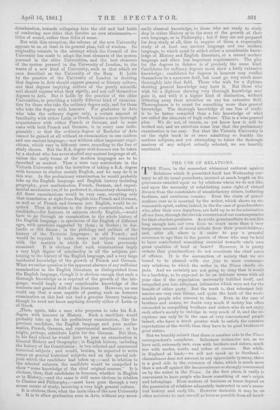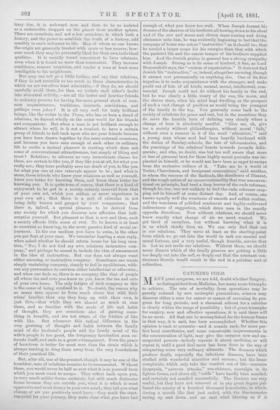THE USE OF RELATIONS.
THE Times, iu the somewhat whimsical outburst against Relations which it permitted itself last Wednesday con- trary to all its usual precedents, insisted at much length on the grievances entailed upon us by relations whom we do not like, and upon the necessity of establishing some right of virtual divorce from the constraints of unsatisfactory sisters, bothering brothers, and cumbrous cousins. Even the claim of grand- mothers over us is resented by the writer, which shows an un- reasonable spirit, unless, indeed, in the the case of grandmothers who, after their own departure, are held up to us for admiration all our lives, through the slavish veneration of our contemporaries for their obsolete greatness. Asa rule, grandmothers do not live long enough into our own lives to exact more than a very temporary amount of moral tribute from their grandchildren s and, after all, where is it easier to pay a graceful reverence to age than in the person of those who may be held to have contributed something essential towards one's own great qualities of head or heart P However, it is pretty certain that grandmothers do. not constitute the chief cause of offence. It is the assumption of society that we are bound to be pleased with our sties to more contempo- rary relations, to which the writer in the Times chiefly oh- jects. And we certainly are not going to deny that it would be a hardship, to be expected to be on intimate terms with all your clan if the expectation necessarily fulfilled itself, and compelled you into reluctant intimacies which were not for the benefit of either party. But the truth is, that reluctant inti macies are very rare things, and quite the fault of the weal:- minded people who consent to them. Even in the case of brothers and sisters, we doubt very much if society has often succeeded in compelling brothers and sisters who do not enjoy- each other's society to indulge in very much of it, and the ex- ceptions can only be in the case of very conventional people indeed, who have a much greater wish to satisfy the common expectations of the world, than they have to be good brothers or good sisters. But we litunbly submit that there is another side to the Tima. correspondent's complaint. Reluctant intimacies are, as we have said, extremely rare, even with brothers and sisters, much less with uncles, aunts, and tribes of cousins. But while, in England at least,—we will not speak as to Scotland,— clannishneski does not amount to any appreciable tyranny, there is a good side to the existence of clans, which is much more than a set-off against the inconveniences so strongly commented on by the writer in the Ti gyres. In the first place, it really is convenient to have people who know something of one's origiti and belongings. Even matters of business at times depend on the possession of relations adequately instructed in ono's ances- tral history and early life. However desirable it may be on other accounts to cast oneself as loose as possible from all hosed-
itary ties, it is awkward now and then to be as isolated as a metoorolite dropped on the planet from another sphere. There are occasions, and not a few occasions, in which both a history, and the power to establish the truth of a history, add sensibly to one's influence in life. Men of whom no one knows the origin are generally treated with more or less reserve, how- ever much they may be personally liked for their own individual qualities. It is usually found convenient to have relations, oven when it is found no more than convenient. They increase confidence, remove suspicion, and render a man at least more intelligible to his neighbours.
But may one not go a little further, and say that relations, if they do not resemble us too much in those characteristics in which we are ourselves least admirable,—if they do, we should carefully avoid them, for then we irritate each other's faults into abnormal activity,—are all the better and heartier friends to ordinary persons for having the same general stock of com- mon acquaintances, traditions, interests, convictions, and perhaps even jokes P It is all very well for truly brilliant beings, like the writer in the Times, who has so keen a dread of relations, to depend wholly on the outer world for his friends and companions. But when a man is not brilliant enough to attract whom he will, is it not a comfort to have a certain group of friends to fall back upon who are your friends because you have been drawn together by the same external occasions, and because you have seen enough of each other in ordinary life to excite a mutual pleasure in meeting which does not come of conversational attractiveness, but simply of liking and trust P Relations, to advance no very immoderate claims for them, are certain to like you, if they like you at all, for what you really are ; they have probably seen too Much of you, to like you for what you can at rare intervals appear to be ; and what is more, those friends who know your relations as well as yourself, know you better for knowing them, and know them better for knowing you. It is quite true, of course, that there is a kind of enjoyment to be got in a society entirely removed from that of your own set, which you seldom or never experience in your own set ; that there is a sort of stimulus in not being fully known and gauged by your companions ; that there is, indeed, a special pleasure to be derived from any society for which you discover new affiuities that half- surprise yourself. But pleasant as that is now and then, such a society affords little souse of rest. To be known is at least as essential as knowing, to the more passive kind of social en- joyment. In the one medium you have to swim, in the other you eau float at your ease. We remember hearing a man reply, when asked whether he should return home for his loug vaca- tion, "No ; I do not find my own relations instructive com- pany," and perhaps he meant to include the idea of amusement in the idea of instruction. But one does not always want either amusing or instructive company. Sometimes one wants simply sustaining company, simply to feel in equilibrium, with- out any provocation to exertion either intellectual or otherwise ; and when one feels so, there is no company like that. of people all whose ins and outs you Inow as you know the ins and outs of your own home. The only fatigue of such company as this is the sense of being confined to it. No doubt, the reason why so many men appear to form much closer ties with their wives' families than any they keep up with their own, is just this,—that while they are almost as much at ease there, and as familiar with the mode of life and habit of thought, they are conscious also of gaining some- thing in breadth, and are not aware of the friction of like with like. But whenever this radical difference in the very graining of thought and habit between the family mind of the husband's people and the family mind of the wife's people is too great, the temporary fascination soon ex- hausts itself, and ends in a great estrangement. Even the peace of humdrum is better for most men than the strain which is always tending to drag them away from the very foundations of their practical life.
But, after all, one of the greatest, though it may be one of the humblest, uses of relations remains to be enumerated. Without them, you would never be half so sure what it is in yourself from which you most want to escape. They reflect back upon you, in very much milder forms certainly, but still much distiucter forms because they are outside you, what it is which is most oppressive and most dreary iu your own mind ; they tell you what change of air you positively must have,—they mark the start- mg-point for your journey, they make clear what you have had
enough of, what you know too well. When Joseph dreamt his dreams of the sheaves of his brethern all bowing down to his sheaf and of the sun and moon and eleven stars coming and doing obeisance unto him, lie was evidently beginning to feel that the company of home was not as " instructive " as it should be ; that he needed a larger scope for his energies than that with which the pastoral life and the coarse temper of his brothers supplied him. And the Jewish genius in general has a strong sympathy with Joseph. Strong as is its sense of kindred, it has, as Lord Beaconsfield says, the " custom of expatriation." It does not find Jewish life "instructive," or, indeed, altogether amusing, though it cannot rest permanently on anything else. One of its first impulses is to make acquaintance with the stranger, and make profit out of him of all kinds, mental, moral, intellectual, com- mercial. Joseph could not do without his family in the end, but he was clearly a little weary of the sun, the moon, and the eleven stars, when his mind kept dwelling on the prospect of such a vast change of position as would bring the youngest of the family to the top. You generally conic back to the society of relations for peace and rest, but in the meantime they do serve the humble turn of defining very clearly where a change of tone is absolutely needful. " Give me, oh, give me a society without philanthropies, without moral ' fads,' without even a rumour in it of the word. education,' " said a young than whose soul had been heavily burdened with the duties of Sunday-schools, the lore of reformatories, and the yearnings of his relatives' hearts towards juvenile delin- quents; and who, no doubt, was but too well aware that more or less of personal bent for these highly moral pursuits was im- planted in himself, or he would not have been so eager to escape from the exclusive culture of it. "Take me to a world of Tories, Churchmen, and benignant conventions," said another, in whom the rancour of the Radicals, the dissidence of Dissent, and the rough antics of an unconventionality that was unconven- tional on principle, had bred a deep horror of the rude reformer, though he, too, was not unlikely to find the rude reformer crop- ping out in himself at some distant day. And, of course, one knows equally well the weariness of smooth and selfish routine, and the weariness of polished sentiment and highly-cultivated indirectness of suggestion, which drive men in the exactly opposite directions. Now without relations, we should never know exactly what change of air we most wanted. We get tired of ourselves, but without knowing what it is in us which chiefly tires us. We can only find that out in our relations. They serve at least as the starting-point from which we go out into the world to seek our mental and moral fortune, and a very useful, though humble, service that is. Let us not revile our relations. Without them, we should never discern which of the family grooves are getting a little too deeply cut into the soil, so deeply cut that the constant con- tinuance therein would result in the end in a painless sort of extinction.



































 Previous page
Previous page